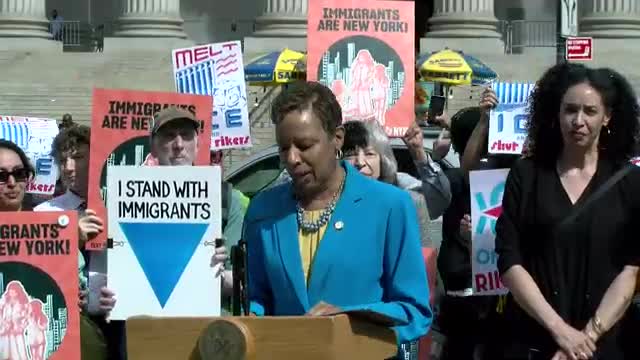City Council, advocates praise judge's order blocking ICE presence on Rikers and vow to keep agency off island
Get AI-powered insights, summaries, and transcripts
Subscribe
Summary
New York City Council Speaker Adrienne Adams and immigrant-rights advocates announced a state judge extended a temporary restraining order that bars the Adams administration from implementing Executive Order 50 to allow ICE on Rikers Island. Speakers said the move protects due process and public safety and reiterated calls to close Rikers.
New York City Council Speaker Adrienne Adams announced that a New York State Supreme Court judge extended a temporary restraining order preventing the Adams administration from implementing Executive Order 50 to allow Immigration and Customs Enforcement to operate on Rikers Island.
The announcement came at a Friday press event where Council members, criminal defense attorneys and immigrant-rights advocates said the court action protects due process for residents and helps preserve the city's sanctuary policies. The council filed a lawsuit last week seeking to block the executive order; the judge's extension keeps the administration from finalizing any memorandum of understanding or operational plans while the case proceeds.
———
New York City Council Speaker Adrienne Adams said, "I am so happy to announce that just moments ago, New York State Supreme Court Judge Mary Rosado extended a temporary restraining order she issued on Monday to prohibit Mayor Adams' administration from implementing Executive Order 50." Adams framed the order as a check on the mayor's effort to permit ICE operations at Rikers Island and said the council will continue with its legal challenge seeking a preliminary injunction.
Council Member Alexa Avile9s, chair of the Council's Immigration Committee, said the administration's move would "treat New Yorkers as pawns" and that the council and advocates had worked "tirelessly to protect our immigrant New Yorkers." Murad Awada, president and CEO of the New York Immigration Coalition, described people being taken off sidewalks and flown out of the city without due process and urged officials to preserve sanctuary protections.
Speakers linked the legal fight to broader concerns about public safety and Rikers Island's conditions. Conrad Blackburn of The Bronx Defenders, who identified himself as a policy counsel and staff attorney in the criminal defense practice, said returning ICE to Rikers would deter people from participating in the criminal-justice process and would worsen case delays. "When ICE disappears someone, their cases are unfairly delayed," Blackburn said.
Advocates cited systemwide harms they attribute to reintroducing ICE at the jail complex: families declining to visit detained relatives, witnesses and victims avoiding contact with police and court, and longer dockets and stays at Rikers. Melanie Dominguez of the Cattell Center noted the death toll and crowded conditions she said have worsened under the mayor's watch: "Under his watch, at least 38 people have died in New York City jails," she said, and she characterized current detention numbers as nearly 7,500 people.
Council members at the event emphasized the council's legal role. Adams said the court's action prevents the administration from "operationaliz[ing] ICE on Rikers" or finalizing an MOU while the litigation proceeds. The council's complaint, speakers said, alleges the executive order conflicts with city law and that the mayor's discussions with federal authorities raised conflict-of-interest concerns; the mayor and his lawyers have pushed counterarguments in court, including claims of imminent harm if the order is blocked.
Speakers also pressed for policy change beyond the immediate litigation. Several called again for the eventual closure of Rikers Island. Council Member Tiffany Cabe1n, who said she previously worked as a public defender, described ICE's presence at the jail as a threat to due process. Council Member Gail Brewer said data about Rikers' operations are already hard to obtain from the Department of Correction and expressed skepticism about ICE providing accurate information.
The event included remarks from multiple immigrant-rights groups, including Make the Road New York and the New York Immigration Coalition, and from criminal-defense and public-interest legal organizations. Speakers repeatedly urged the administration not to proceed while litigation is pending and said they would continue both legal and public advocacy.
The court action announced at the press event is temporary by definition: it prevents specified implementation steps while the court considers the council's broader request for a preliminary injunction. Council leaders said they will present fuller legal arguments to the court in the coming weeks.
Ending: The press event concluded with speakers reiterating their demands that ICE not be allowed on Rikers Island and restating calls to accelerate plans to close the jail complex. The legal challenge will proceed in state court; the judge's extension leaves in place the current block on moving forward with executive-order implementation until the court resolves the council's claims.
